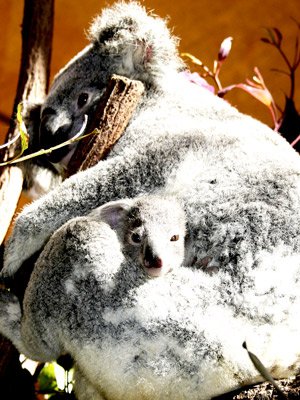
Crucial knowledge on how Queensland koalas adapt to heat, cope with habitat loss and transmit common diseases will be the focus of five research projects.
The Queensland Government has announced that The University of Queensland (UQ) will receive the lion’s share of $3.2 million in funding, as part of the Newman Government’s “Investing to protect our Koala” initiative.
UQ wildlife biologist, Dr Steve Johnston, welcomed the support of $2.6 million in funding to the university's koala research.
"The projects will deliver meaningful results to better inform koala conservation efforts," Dr Johnston said.
One research project will investigate the effects of chlamydia in male koalas.
“While there has been a lot of work investigating the pathology of chlamydia in female koalas, studies on the incidence and pathology of the organism in male koalas has up to this point been very limited,” Dr Johnston said.
“Preliminary investigations have indicated that chlamydia can cause sterility in some males, but the extent to which this occurs and under what conditions remains to be determined.”
Building upon previous UQ research, the team will learn how the organism is transmitted and what effect chlamydia might have upon the koala sperm cell, particularly sperm DNA.
Dr Johnston has indicated their team will also attempt to establish “clean -up” technologies to screen and remove the disease from semen of infected males.
“The sperm then has the potential to be used in artificial insemination programs to recover genetics from animals that might otherwise be lost to the general koala population,” Dr Johnston said.
Dr Bill Ellis, Head of UQ’s Koala Ecology Group and Research Fellow at UQ’s Sustainable Minerals Institute , will also play a key role in the research projects investigating disease transmission and how koalas adapt to extreme climatic conditions.
“We need to know what elements of their environment are essential to survival during heat waves, so we can protect, or even augment these features in developing landscapes,” Dr Ellis said.
“Understanding how koalas modify their behavior and how they use their environment when it becomes very hot and dry will be fundamental to this knowledge.”
Dr Ellis is also eager to discover why all populations of koalas infected with chlamydia are not in decline as a result.
“This will help us mitigate the impacts of the disease where it is causing population declines and also provide some basic knowledge of how social behavior influences pathogen transmission in this species.”
The five UQ research projects include:
• University of Queensland - $322,824, Pathways of pathogen transmission in the koala
• University of Queensland - $655,875, The pathology, incidence, treatment and management of Chlamydiosis in the male koala
• University of Queensland - $420,723, KoalaBase – standardised diagnostic procedures and epidemiological approaches, enhancing passive surveillance of SEQ koala disease
• University of Queensland - $527,237, Behavioural and physiological adaptation to heat in the koala
• University of Queensland - $342,664, Investigation into koala retrovirus pathogenesis for the improvement of koala conservation
Media: Dr Steve Johnston, 0408 280 963 or s.johnston1@uq.edu.au, Dr Bill Ellis, 0428 105 275, w.ellis@uq.edu.au
.jpg)



